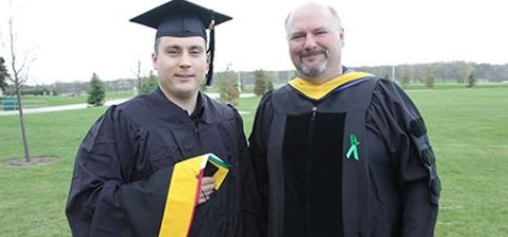The online Sustainable Management master’s program is a collaborative effort of five UW System institutions: UW-Green Bay, UW-Oshkosh, UW-Parkside, UW-Stout, and UW-Superior. Launched in 2013, the master’s degree program is designed for working adults with real-world experience and offers flexibility to students who balance family, a job, and other commitments.

Matthew Christianson, UW System’s first Sustainable Management master’s degree graduate, with professor John Katers.
A veteran, his family, and a dream
One of the first master’s degree students was Matthew Christianson, who graduated in May 2014. Matthew grew up in Sturgeon Bay, Wis., graduated high school in 2004, and then enlisted in the U.S. Marine Corps. After serving, he used his veterans benefits to go back to school, enrolling as an undergraduate at UW-Green Bay and then as a Sustainable Management graduate student in the spring of 2013.
Being married with two young sons and working full time as a production supervisor, Matthew decided to fast-track his studies, aiming to finish as quickly as possible. He understands many of the challenges facing nontraditional students. “I found it challenging on a personal level to balance getting through the program quickly while also raising a family,” Matthew says.
A capstone project tailored to his interests
In addition to the 60 credits of required coursework, the Sustainable Management master’s program requires each student to complete a capstone course—a hands-on project at a company or organization that gives the student new skills and the organization new information to use in its sustainability efforts. Matthew’s capstone involved a quintessential Wisconsin organization: the Green Bay Packers.
The Packers were a natural choice for Matthew’s capstone because of the organization’s importance within Wisconsin culture. Matthew says, “The Packers have a unique relationship with the people of Wisconsin, and that creates leverage in terms of sustainability. We can work toward a cultural shift toward more sustainable practices because people trust a sports franchise like the Packers organization.”
Sustainability work at the Green Bay Packers stadium
Matthew helped the football franchise “green” their operations by finding ways to reduce energy and water consumption; increase positive PR for green activities; reduce waste; and increase the Packer fan base through environmentally responsible practices.
For example, Matthew had specific recommendations for the Packers when it came to reducing waste. The organization was already at a very respectable 88 percent diversion rate, achieved by working with their partners at Waste Management (recycling stadium waste) and Sanimax (decomposing byproducts, such as uneaten food cooking oil). But he knew there were additional opportunities, including working with suppliers who use decomposable or recyclable packaging and better waste management in the stadium parking lots. Tailgating is a cherished part of the Packers experience, but it also produces a lot of waste. Matthew suggested adding more waste containers and staff monitoring to help fans cut down on waste both inside and outside the stadium.
Career transformation
Matthew’s goal is to pursue a whole new career—one that requires management skills he’s developed through the master’s degree program. The capstone project was an excellent launching pad. He now has practical experience applying many of the sustainable business concepts he learned in the classroom. And it doesn’t hurt to have both “University of Wisconsin” and “Green Bay Packers” on his resume.
UW Sustainable Management also offers a bachelor’s degree and two certificates. For more information about the program, explore the website, download the program guide to the right, or speak with an enrollment adviser at 1-877-895-3276 or learn@uwex.edu.
By Crystal Fey and Lisa Agnew Nielsen
